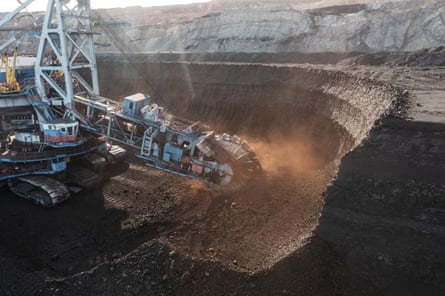Governments around the world are ramping up coal, gas and oil extraction which will put climate goals beyond reach, new data has shown.
Far from reducing reliance on fossil fuels, nations are planning higher levels of fossil fuel production for the coming decades than they did in 2023, the last time comparable data was compiled.
This increase goes against the commitments that countries have made at UN climate summits to “transition away from fossil fuels” and phase down production, particularly of coal.
If all of the planned new extraction takes place, the world will produce more than double the quantity of fossil fuels in 2030 than would be consistent with holding global temperature rises to 1.5C above preindustrial levels.
Emily Ghosh, a programme director at the Stockholm Environment Institute (SEI) in the US, said: “Fossil fuel production should have peaked and started to fall. Every year of delay [to the peak and rapid fall required] significantly increases the pressure [on the climate].”
She said an urgent “course correction” from governments was needed, but the current and planned overproduction of fossil fuels meant the world was burning through its remaining “carbon budget” – the amount that can be emitted without permanently exceeding the 1.5C threshold – at a rapid rate.
The Production Gap 2025 report, from the SEI, the Climate Analytics thinktank and the International Institute for Sustainable Development, analysed 20 major producers of fossil fuels around the world, including the US, Russia, Saudi Arabia, China, Canada, Brazil, Australia and the UK, together representing about 80% of global fossil fuel production.
Only the UK, Australia and Norway plan to reduce production of oil and gas by 2030, compared with 2023 levels. Eleven of the 20 countries surveyed have increased their plans for fossil fuel production since they were last analysed in 2023.

Several countries are planning at least to cut coal production, including China, the US, Germany and Indonesia. But India, Russia, Colombia and Australia will ramp up their mining.
Demand for fossil fuels is also key – countries must pursue renewable energy and use energy more efficiently to obviate the need for new oil, gas and coal production. Neil Grant, of Climate Analytics, said: “So far, renewable energy growth has been an addition, alongside fossil fuel demand, and we haven’t seen peak demand. But given the pace of change in the energy system that could change quite significantly.”
As transport, heating and other functions become electrified, less primary energy is needed, as electrification is much more efficient. But less demand for fossil fuels could also make them cheaper, spurring a rebound effect.
“We are in the foothills of an energy transition that is going to reshape fossil fuel demand,” said Grant. “But many governments are thinking in terms of a world where the energy transition happens very incrementally. There’s a lot of danger, [including that] the voice of the fossil fuel lobby only gets louder and holds us back from this change to a cleaner, better, greener economy. That would lead to climate chaos or significant negative economic impacts.”
All countries agreed at the Cop26 UN climate meeting in 2021 to “phase down” coal. The original commitment was to “phase out”, though without a timeline, but a last-minute intervention by China and India resulted in the weaker language being accepted.
At the Cop28 summit in Dubai in 2023, countries agreed to “transition away from fossil fuels”, though without specifying what this would mean in practice.
after newsletter promotion
Derik Broekhoff, the lead author of the report published on Monday, said: “In 2023, governments formally acknowledged the need to move away from fossil fuels to mitigate climate change. But as our report makes clear, while many countries have committed to a clean energy transition, many others appear to be stuck using a fossil-fuel-dependent playbook, planning even more production than they were two years ago.”

The Production Gap 2025 report comes as world leaders prepare to meet the UN secretary-general, António Guterres, in New York this week on the sidelines of the UN general assembly.
Guterres will urge countries to come up with fresh commitments to reduce greenhouse gas emissions ahead of the Cop30 summit in Brazil this November. Under the 2015 Paris agreement, governments must submit new national plans this year setting out their plans to 2035.
But the UN’s climate chief, Simon Stiell, has already told the Guardian that the national plans would be inadequate to keep the world within the 1.5C limit. Instead, the UN is hoping that countries will agree ways to strengthen their commitments in future and to bring other forces, such as private sector investment, to bear.
On Monday, a separate report from the Industrial Transition Accelerator estimated that of more than 700 low-carbon industrial installations in planning and development around the world, only 15 a year were gaining the finance necessary to go into full production. This represented a $1.6tn (£1.2tn) opportunity for investors, the group said.
“To keep the 1.5C goal in reach, the world needs rapid reductions in coal, oil and gas investments, redirecting those resources towards an energy transition that prioritises equity and justice,” said Ghosh. “Governments must commit to expand renewables, phase out fossil fuels, manage energy demands and implement community-centred energy transitions.”

 3 months ago
88
3 months ago
88

















































